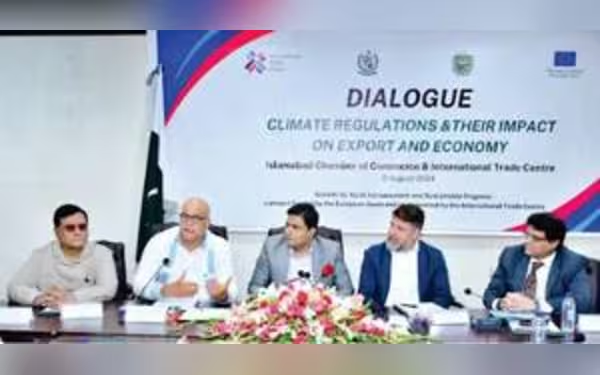Wednesday, January 15, 2025 06:58 AM
Icci Hosts Dialogue On Eu Climate Regulations Impacting Pakistani Exports
- ICCI emphasizes compliance with EU environmental standards.
- High power tariffs challenge Pakistani exporters.
- Collaboration needed for sustainable trade practices.
 Image Credits: nation_pk
Image Credits: nation_pkICCI discusses EU climate regulations and their impact on Pakistani exports, emphasizing compliance and collaboration for sustainable trade.
ISLAMABAD - The Islamabad Chamber of Commerce and Industry (ICCI) recently held an important session titled ‘Dialogue on Climate Regulations by EU and their Impact on Exports’. This event brought together a large number of exporters and key government officials to discuss the new environmental regulations set by the European Union (EU) and their potential effects on Pakistani exports. Understanding these regulations is crucial for Pakistani businesses as they strive to maintain their competitiveness in the global market.
During the session, Ahsan Zafar Bakhtawari, President of ICCI, emphasized the need for Pakistani businesses to align with the EU’s environmental standards. He pointed out that exports to the EU are vital for Pakistan, making it essential for exporters to be aware of and comply with these new regulations. Bakhtawari noted that while Pakistan's carbon emissions are significantly lower than those of neighboring countries, the nation still suffers greatly from the impacts of climate change. He argued that this situation warrants special consideration for Pakistan as it adapts to the new regulations.
Bakhtawari also raised concerns about the high power tariffs in Pakistan, which already put exporters in a difficult position. He urged for a gradual implementation of the Carbon Border Adjustment Mechanism (CBAM) to ease the burden on exporters. Additionally, he invited the International Trade Centre (ITC) delegation to visit major cities like Karachi, Lahore, Faisalabad, and Sialkot to better understand the challenges faced by local exporters.
Zafar Bakhtawari, a former president of ICCI, echoed these sentiments, highlighting the need for concessions for developing and least developed countries regarding the implementation of the new regulations. Robert Skidmore, who moderated the session, discussed the support available to Pakistani businesses to help them transition to more sustainable practices. He introduced the Growth for Rural Advancement and Sustainable Progress (GRASP) project, which aims to assist small and medium-sized enterprises (SMEs) through capacity building and policy initiatives.
Escipion Joaquin Oliveira Gomez, Director of the International Trade Centre, provided an overview of the new EU regulations and their implications for Pakistani exports. He stressed the importance of sustainability in global trade and how these regulations are designed to promote sustainable production practices worldwide. Atif Aziz, a representative from the Ministry of Commerce, discussed the government's role in facilitating this transition, mentioning ongoing efforts to develop policies that help exporters meet international environmental standards.
The dialogue highlighted the urgency for Pakistani businesses to adapt to the EU’s stringent new trade regulations, which are part of the European Green Deal aimed at making Europe the first climate-neutral continent by 2050. Adnan Lodhi from ITC informed participants that Pakistan’s exports, particularly in textiles, agriculture, and manufacturing, would be directly impacted by these changes. Former ICCI President Mian Shaukat Masood also contributed to the discussion by suggesting remedial measures to address the challenges faced by exporters.
The session underscored the critical need for awareness and collaboration among Pakistani businesses, the government, and international partners like the ITC. By working together, they can navigate the complexities of the new EU regulations and foster a more sustainable and resilient trade relationship between Pakistan and the European Union. This cooperation is essential for ensuring that Pakistani exporters can thrive in an increasingly competitive global market.













